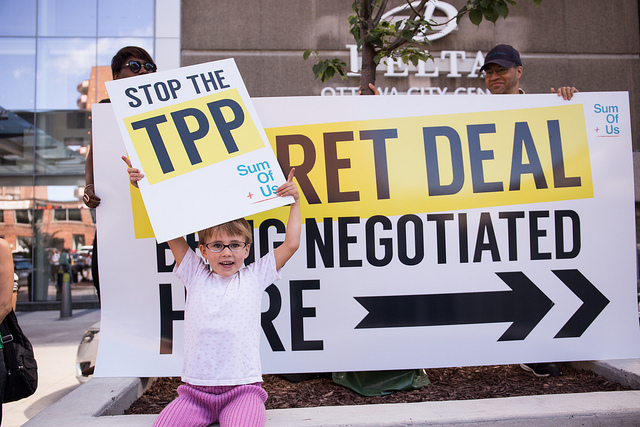Canada’s media have heaped fawning praise on the Trans-Pacific Partnership, the biggest free trade and investment deal in years. Rather than raising questions and red flags over a secret deal with mixed impacts, our media has been cheering and patting elites on the back.
Negotiations over the TPP concluded early Monday morning in Atlanta. The deal was signed onto by 12 countries from around the Pacific Rim, including Canada. Details of the deal are murky as the negotiations were secret and the final text has yet to be released.
More to the point, Canada already has existing free trade accords with many of the countries involved in the deal and low tariffs on imports and exports. Nobel Prize-winning economist Joseph Stiglitz, among others, has pointed out these deals are less about the economics of trade and more about the political clout of corporations in today’s already-globalized world.
Rather than pausing for critical reflection and investigation, Canada’s mainstream media and pundit class initiated a TPP love-in. To see just how narrow the range of opinion is, try to spot the difference in the following quotes from the editorial and opinion pages of Canada’s major newspapers and magazines.
Here’s the Globe and Mail:
the TPP represents a clear win for Canada, one that serves the national interest and is especially beneficial for consumers.
Or try Maclean’s:
And, as with most things, the best sort of trade is free.… this week’s Trans-Pacific Partnership (TPP) deal should be properly celebrated by all Canadians for putting our country at the forefront of international trade and helping to ensure our future prosperity.
Then there’s the Ottawa Citizen:
There is no surer way than trade liberalization to ‘grow the economy’, to borrow the phrase so loved by politicians on the campaign trail.
Not to be outdone, the National Post published a piece this week claiming the TPP did not go far enough.
The only notable outlier was the Toronto Star editorial board, which was more guarded in its assessment and called for more scrutiny. Otherwise, even newspapers nominally considered to occupy different ends of the (very narrow indeed) political spectrum were merely competing by seeing who could adorn the TPP with the most superlatives.
Elsewhere alternative views came from surprising sources: even the business-friendly Bloomberg View saw a mainstream economist questioning whether free trade is the “no-brainer” it once was. Beyond the pain free trade can inflict on workers in particular sectors, like auto manufacturing, we all lose if the TPP institutes and strengthens intellectual property protection rackets for large corporations in fields from pharmaceuticals to culture. This should be considered problematic even by those who defend “free market” economic orthodoxy.
In short, this deal is at least as much about politics as it is about economics. The goodies for us as consumers hide fundamental attacks on democracy that affect us as citizens and as workers.
This deal looks to whittle away rights that we likely won’t get back without a fight. A magazine in Australia compared the TPP to a “one-way ratchet”: its rules will create new minimum standards with pressure only to drive them even lower.
For example, we do not know how strong the so-called Investor-State Dispute Settlement clause will be in this new agreement—and it’s important. ISDS clauses are well known from other free trade agreements like NAFTA and essentially allow corporations to take governments to (secret) court for setting too high of standards on things like labour or environmental protections. In fact, under NAFTA’s Chapter 11 ISDS mechanism, Canada has been sued more often than any other country.
We do not know what the final TPP text actually contains. There have been leaks, most recently when the deal was signed, but they have been those that the negotiators themselves have wanted to get out. While Canada’s media have seized on carefully selected tidbits, a critical and engaged press should be probing behind the official boosterism rather than lazily accepting its positive spin. This is especially true when a major deal like this is announced just two weeks before a federal election.
To paraphrase something a friend recently said: when neoliberalism finally kicks the bucket across the world, Canada’s elites will the last ones still singing its praises. This week, we got a sample of this near-sighted, profit-minded chorus drowning out any opposition to what is far from a unilaterally good deal.
This piece originally appeared at Ricochet.
